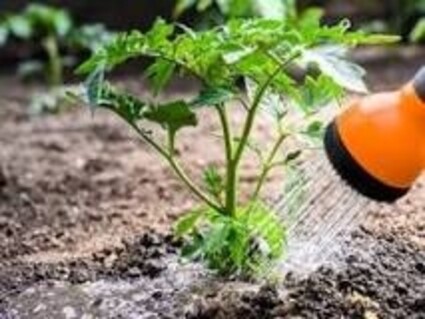Watering Techniques: The Right Way?
Last updated 5/30/2023 at 7:11pm

Understanding correct watering techniques conserves water and provides plants with beneficial water without wasting water, Texas' most precious natural resource
Gardeners, certainly many of you (me included) have devoted an enormous amount of time outdoors this spring preparing and planting flower beds, vegetable gardens, and manicuring lawns. Crafting and detailing specific areas: flower beds, vegetable gardens, porches, and patios exactly the way we want them to appear! The official start of summer is 21June, which is about 3 weeks away, though to me summer 'feels' as though it's arrived! No need to smirk or roll your eyes-I'm not complaining (okay, well, maybe a little) but I do enjoy this season of the year. Let's review watering techniques to maintain our landscapes, flower beds, and vegetable gardens.
Plants need water to grow and hot weather or extreme temperatures can damage plants, therefore it's essential to follow an effective watering schedule during the summer months. It is obvious that plants need water to survive, yet many gardeners don't know the optimal time to water plants. Naturally, there are numerous opinions on when and how to water the plants since we all want to keep our lawns and gardens growing and looking their best. It is important to note water conservation is essential for each of us and that water is Texas' most precious and valuable natural resource that should never be wasted! The way we apply water to our plants is important.
There is no use in applying water faster than the soil can absorb it when watering a lawn. When water is applied excessively, it runs down the curb into the street or provides relief to your neighbor's lawn, at your expense!
Most soil types in SETX tend to be clay and clay soils take water in slowly, often taking days after a heavy rain event. Please note that a drip hose or a drip irrigation system is the most effective and efficient use of water for flower beds and vegetable gardens.
Utilize mulch throughout garden areas. Mulch, mulch, mulch whenever possible! The use of mulch has numerous benefits for trees, shrubs, flower beds and vegetable gardens, since mulch conserves soil moisture, and lowers soil temperature during the summer (has the opposite effect in winter). Use a 2-to-4-inch layer of organic mulch (leaves, pine bark, or grass clippings).
There are experts who state night-time watering is detrimental to your landscape plants and lawns, stating plant diseases will develop, and this certainly is possible. But I find that there are times when it is acceptable and necessary to water the lawn and plants at night! An example is when daytime temperatures are extreme, 95F or higher, this gardener provides night watering to allow the landscape to absorb water over a longer time interval, through repeated watering to allow for deep watering. Further, I have been known to water during the 'heat of the day' to keep my garden plants and lawn thriving, though it must be noted the evaporative loss is greater (this option is seldom used). The evaporation of water cools plants quickly, which is often beneficial to the plant!
So, let's discuss an effective summer watering schedule. Many experts consider the most appropriate time for watering plants to be early morning or late evening since the sun is at its lowest allowing time for the soil to absorb water before the temperature increases.
Early Morning Watering:
Boosts plants natural growth cycle.
Plants are ready to absorb water to help them through the days' heat.
Water absorbs into the garden area, reaching the plants root system with little evaporative loss.
Prevents fungal disease by providing time to 'dry' before night fall,
Evening Watering:
Plants absorb water before nightfall and will not hamper their growth.
Allows plants several hours to uptake water and evaporation is reduced.
Time is needed to allow plant leaves to dry before night fall to minimize fungal disease.
Utilizing a drip hose or drip irrigation system a gardener can water during night fall since leaves remain dry.
In conclusion, each of us must do our part by not watering our lawns and plants excessively. Water plants with care to save time and money, while making the most of every drop. So long for now fellow gardeners, let's go out and grow ourselves a greener, more sustainable world, one plant at a time! If you have gardening questions, email me: [email protected] or phone the Orange County Master Gardeners Helpline: (409) 882-7010.













Reader Comments(0)